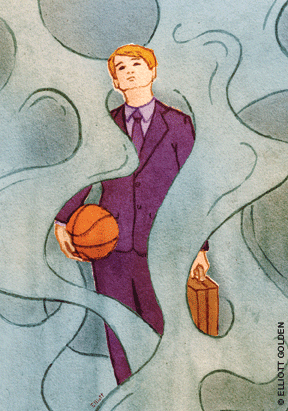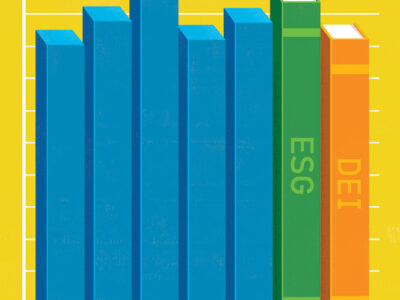
If sports is human life in microcosm, as Howard Cosell put it, what about sports agents? The man to answer that question would be the David W. Hauck Professor and professor of legal studies and business ethics, Kenneth Shropshire, who also directs the Wharton Sports Business Initiative. In his freshly updated book, The Business of Sports Agents, Shropshire and co-author Timothy Davis delve into the past, present, and future of a profession that often seems in sore need of its own referees. Gazette summer intern Ken Nwannunu C’10 caught up with Shropshire by email to chat about racial issues in sports agency, the state of amateurism, and—couldn’t resist it—Jerry Maguire.
How did you start out in sports law?
I have enjoyed sports my whole life. While in college, when it became clear I was not going to be a professional athlete, I made a conscious decision to have a professional career in sports. I was fortunate enough to get a job straight out of law school at a law firm that did a great deal of work in the sports industry. From there, I landed the job of a lifetime when I worked for the Los Angeles Olympic Organizing Committee from 1982 to 1985. I initially worked to close sponsorship and licensing deals, and then ended up being in charge of boxing.
This is the second edition of your book. What’s changed in the world of sports agency since the last time around?
There is now even more money. From the standpoint of the agent business, a period of rapid consolidation of agencies has ended. It is also a moment when industry observers are waiting to see what the agendas are for relatively new players, like Creative Artists Agency and Wasserman Media Group.
You devote a whole chapter to the history and definition of amateurism in collegiate sports. Why has amateurism become such a fraught issue?
Ancient concepts of amateurism are a myth. There was no ancient Greek society that celebrated amateurism in the way we’ve popularly conceived it in order to build amateur models in the NCAA and the Olympics. The fear of compensation for athletic performance is without foundation. It was the existence of these rules that provided a broad opening for unscrupulous agents to provide money to “amateur” athletes who needed it and had no other source to seek it from. This is the kind of opportunistic behavior that amateurism has allowed to exist in so many settings, and that is still present in the agents’ business of recruiting athletes.
You talk about what you call the “white agent/black athlete dichotomy” in your book. Why is this dynamic so prevalent, and should we be more concerned about it?
It’s interesting. That issue has improved dramatically since I first wrote about it two decades ago. As in any other sector of society, I’m sure race is still a factor in some athletes’ agent selection process, and in the sales pitch of some agents. The book explores the changes in the numbers of representations across races. Real progress will be here when the number of white athletes represented by black agents increases dramatically. That number is still minuscule.
Like many in my generation, I grew up inspired by principled and pious figures like Jerry Maguire and Arli$$. But considering all of the unscrupulous and cutthroat real-life behavior that you describe in your book, it’s hard to imagine any redeeming qualities or silver linings in the industry. Are there any?
It’s just like any other profession. There are some good and some bad—and the bad get the lion’s share of the press coverage. Many agents do an outstanding job for their clients.




